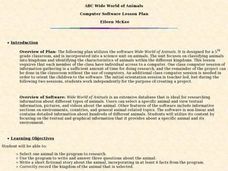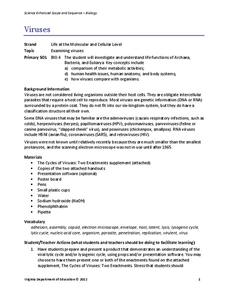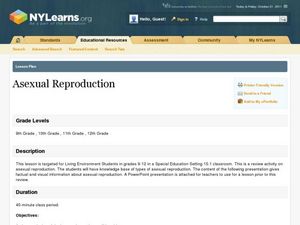University of Hawaiʻi
Taxonomy and Me!
Taxonomy is the study of organisms and how you phylum. Three biology activities are included, helping scholars understand four of the six kingdoms, specifically Protista, Plantae, Fungi, and Animalia. Scholars observe and classify in...
National Nanotechnology Infrastructure Network
Biology Reference Sheet
First year life science or biology pupils will appreciate this all-inclusive reference page. It provides a diagram of both a plant and an animal cell, the metric system prefixes, classification levels, definitions for cell processes, the...
Curated OER
Campbell's Biology
Six chapters of a biology characteteristics of different domains xt are covered in this twenty-page assignment. Biology buffs chart the characteristics of different groups of organisms and address many critical-thinking questions about...
Curated OER
The Six Kingdoms
In this kingdoms worksheet, students compare the six different kingdoms. Students complete 2 short answer questions based on this information.
Curated OER
Six Kingdom System of Classification
In this classification worksheet, students complete a graphic organizer comparing and contrasting the characteristics of the 6 different kingdoms.
Curated OER
The Six Kingdoms
In this evolution worksheet, students will determine the evolutionary relationships among organisms using cladograms and phylogenetic diagrams. This worksheet has 13 short answer questions and 3 multiple choice questions.
Virginia Department of Education
Classification of Organisms
Searching for the perfect indoor/outdoor activity that allows class members the opportunity to learn about organism classification? Here, pupils research organisms and categorize them according to domain and kingdom over the course of...
Curated OER
Protists
Sort through the "junk drawer kingdom" as the protists laugh at our attempts to classify them! AP biology classes consider the array of organisms that do not file neatly into the other four kingdoms of classification. Evidence for the...
Curated OER
Systematics and the Phylogenetic Revolution
This assignment conducts a thorough exploration of systematics. Clearly designed for an AP biology course, questions pertain to taxonomic categories, phylogeny, and construction of cladograms.
Curated OER
Taxonomy - The Science of Naming Organisms
Carolus Linnaeus designed the binomial nomenclature system of naming organisms that is still in use more than 200 years later. By viewing this PowerPoint, upcoming biologists learn how to use it. They are also introduced to the hierarchy...
Curated OER
Bacteria
The first slide lists the six kingdoms in the biological hierarchy, but the remaining 10 slides cover characteristics of archaebacteria and eubacteria. Topics include how energy is obtained, arrangement, and shape. This brief, but...
Curated OER
Where Do I Belong?
Tenth graders study the diversity of life in the world. They classify and sketch organisms into the 6 kingdoms.
Curated OER
Naming New Species
Students explore science of taxonomy and the Five Kingdoms of life,
categorize organisms into Kingdoms, and create multi-media presentations illustrating knowledge of a Kingdom. They collect data and related pictures on the Internet,...
Curated OER
Fungi - Review and Reinforce
Diagrams of possible fungi life cycles are printed on the worksheet for biology pupils to evaluate. Short-answer questions ask them to explain what a fungus is, how it obtains food, and what would happen if they ceased to exist. The...
Curated OER
ABC Wide World of Animals
Fifth graders use the software Wide World of Animals. This lesson is incorporated into a science unit on animals. The unit focuses on classifying animals into kingdoms and identifying the characteristics of animals within the different...
Curated OER
Taxonomy and the World of Microorganisms and Viruses
For this taxonomy worksheet, students understand how organisms are classified using Linnaeus' system. Students classify organisms as either plant or animal. This worksheet has 24 fill in the blank and 6 matching questions.
Curated OER
What a Fungi
Seventh graders perform an experiment to determine the best growing conditions for molds. In this life science lesson, 7th graders explain where molds are commonly found. They collect data and draw diagrams of their observations.
Virginia Department of Education
Viruses
Germs, parasites, and viruses, oh my! Facilitate a lesson on viruses as individuals explore functions of Archaea, Bacteria, and Eukarya. They learn how viruses compare with other organisms in nature and how they contribute to health...
Curated OER
Asexual Reproduction
Sixth graders investigate how asexual reproduction produces single-parent offspring. They use plants and yeast to demonstrate vegetative propagation and budding in a laboratory. Students draw five different types of asexual reproduction.
Alabama Learning Exchange
Alex: Organism Power Points/ Booklets
This lesson requires students to use technology to research information on any organism from one of the six kingdoms. Students use the information to produce a PowerPoint presentation or booklet to present to their classmates. This...
Curated OER
Secondary Science Program: The Six Kingdoms
A short overview of the six kingdoms in our scientific classification system: Plants, Animals, Protists, Fungi, Archaebacteria, and Eubacteria. A good explanation of how organisms are placed in their particular kingdom.
Curated OER
Secondary Science Program: The Six Kingdoms
A short overview of the six kingdoms in our scientific classification system: Plants, Animals, Protists, Fungi, Archaebacteria, and Eubacteria. A good explanation of how organisms are placed in their particular kingdom.
Curated OER
Secondary Science Program: The Six Kingdoms
A short overview of the six kingdoms in our scientific classification system: Plants, Animals, Protists, Fungi, Archaebacteria, and Eubacteria. A good explanation of how organisms are placed in their particular kingdom.
Curated OER
Secondary Science Program: The Six Kingdoms
A short overview of the six kingdoms in our scientific classification system: Plants, Animals, Protists, Fungi, Archaebacteria, and Eubacteria. A good explanation of how organisms are placed in their particular kingdom.






















